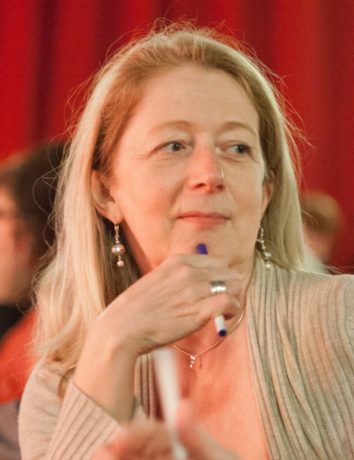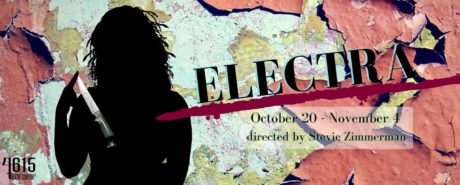Stevie Zimmerman has a reputation in DC as a “must-see” director. She received her bachelors from Oxford and her masters from the University of Leeds in England. She directed The Pitmen Painters and By Jeeves at 1st Stage Theatre, and Doubt at Quotidian Theatre. She directed both Rabbit Hole and Time Stands Still, at Peter’s Alley Theatre Productions. She has also directed at the Capital Fringe, Theatre of the First Amendment, the Playwrights Forum, and the McLean Drama Company at Woolly Mammoth. We interviewed her about her upcoming production, Electra, at 4615 Theatre, which opens October 20.
Sophia Howes: You mentioned that you approached Sophocles’ Electra as a new play. Can you tell us more about that?

Stevie Zimmerman: I think it is always worth approaching plays as if no one has seen them before, even Shakespeare. There’s a freshness to ignoring anything that has been done before. For this piece, I was interested in finding a way to present this ancient story in language that would engage a younger audience, one not versed in the classics perhaps, and to find ways of connecting the story to contemporary concerns. I didn’t want to actually create a contemporary setting and present it in a specific place or time, but rather allow the universality of the story to just ‘be’. It’s an amazing thing about many of the Greek plays we still see performed, that they continue to be resonant literally thousands of years later – it’s kind of wonderful, and terrible.
What was the rehearsal process like?
Very short! We met for the first time at the beginning of October and we open on the 21st. Everyone has been focused and consummately professional. Also very collaborative. I’m not interested in telling actors what to do, or making all the decisions ahead of time, other than in the broadest sense. For the first few days we talked about the story, what had formed and informed each of the characters’ points of view, then we developed pictures on stage that helped explain their relationships to each other.
In what way does empathy and understanding inform your approach to these characters?
Hugely. That’s at the heart of the work we’ve done. Especially with such a non-classical version of the text, we’ve treated it like we would any modern piece, looking for motivation, parallels in our own experiences (without going all Stanislavskian on it!) and deep understanding of what the characters have been through. Electra is a young woman who has lost her father. Yes, she’s the daughter of a king and a queen, but at its heart the play is about loss and grief, and what that does to someone, to anyone.
What is the most important aspect of the production you would like to communicate?
Forget that it’s a “Greek Tragedy.” It’s about people reacting to personal tragedy and the ways in which those reactions differ. Every day we see how people around the world deal with terrible things that happen to them. We see parents of children killed by guns who decide to use their anger and grief to try to change things. We see people finding the deepest forgiveness for atrocities committed against their loved ones. And we see other people fueled by anger and revenge who determine to perpetuate a cycle of violence that has no end. The end of this play is violent, but it’s not conclusive – it doesn’t tell you what is right or wrong in an unjust situation. There are sides and sides, and we all have a choice how we react when we’re wronged or hurt.
Have you approached this piece differently from others you have directed? In what way?
Not really. I think pretty much all plays are about relationships and motivations. Stylistically this play has some non-‘realistic’ elements that take us to a heightened place, and we have had to work on those using other forms to communicate those feelings – music, movement and lighting – which has been a real team effort with Jordan Friend and Paige Washington (music and choreography). But people are people, and we just have to take the leap and make the work.
What was the biggest challenge in rehearsal?
Honestly, there hasn’t been one for this show. This has been one of the most enjoyable processes I’ve ever had. Everyone came in knowing we had an intense, short, rehearsal process, determined to work equally intensely, but we’ve had a lot of laughter and there haven’t been any problems. TOUCH WOOD!!
Do you have a most memorable moment in your directing career? What was it?
Wow. There have been a lot. I think one was doing By Jeeves at 1st Stage. I’d never directed a musical before, nor a farce, but I was fortunate to pick a cast of ten of the most inventive, adventurous and silly actors you could ask for and together we made one of the best loved, most well received shows I’ve ever led. I’m very proud of that show precisely because I didn’t think I could pull it off.
Electra opens October 20 and plays through November 4, 2017 at 4615 Theatre Company performing at The Highwood Theatre – 914 Silver Spring Avenue, Silver Spring, MD. For tickets, call the box office at (301) 928-2738, or purchase them online.





